
Low-cost loans to buy electric vehicles, congestion charges for driving in cities and towns and more reductions in public transport fares must be introduced to start reversing greenhouse gas trends, a said the country's climate advisory team.
The Climate Change Advisory Council (CCAC) also wants the government to declare definitively when it will ban sales of new petrol and diesel cars, and increase the TRV on petrol and diesel vehicles in the meantime.
He also calls for solar panels to be made mandatory on all new buildings and says every home should have a free heat pump assessment.
He also wants to focus on agriculture, saying: "The Council is very concerned about the continued increase in emissions in the dairy sector."
The recommendations are in the CCAC's annual report, released today, which warns that the emissions reductions required by the country's first carbon budget have not been met and that much deeper reductions are now needed to stay on track. the right path.
The chances of this happening are slim, however, as it indicates that the targets set for different sectors of the economy and society are unclear, lack specific actions and do not correspond to the total reduction required by law. .
The members of the CCAC are independent experts responsible for advising the Government on climate policies and actions.
They acknowledge the challenges created by the energy crisis, but say the right response is to help the public, and especially vulnerable households, get through it - not back down from policies aimed at ridding the country of fossil fuels.
They say Ireland's reliance on harmful fossil fuels is to blame for high energy costs and supply insecurity.
"We must continue to focus on reducing our consumption of fossil fuels," said CCAC Chair Marie Donnelly.
"By accelerating the delivery of critically important indigenous renewable resources, Ireland's long-term energy future can be secured, and households and businesses can be protected while supporting climate change goals. "
The report calls for a wider and faster roll-out of home renovations, but said aid for renovation and insulation must first focus on low-income households and homes that depend on coal and peat for heating.
It says households need to be helped to reduce their energy consumption and that installing smart meters and switching to smart electricity tariffs to reward efficient energy use needs to happen much faster.
It also delivers a damning assessment of the carbon budgets adopted by the Dáil last April and the follow-up sectoral emissions caps agreed in July.
An agreement was reached only after causing serious tensions within the Coalition, in particular because of the resistance within the agricultural sector to the objective it proposed.
Our annual budgets call for an average emissions reduction of 4.8% each year from 2021 to 2025, but the first year target has not been met and we now need to achieve an average annual reduction of 8.4% to respect the budget.
The warning echoes that of the Sustainable Energy Authority of Ireland (SEAI) which said yesterday that energy-related emissions increased by 5.4% last year.
"We have used a disproportionate amount of our carbon budget in 2021, which makes the years ahead even more challenging," said SEAI Research Director Margie McCarthy.
"Looking at the early data from 2022, this trend is worryingly continuing."
The CCAC also takes issue with the way carbon budgets were calculated, saying that even if fully achieved, they would only represent a 42% reduction in national emissions by 2030, not the 51% required under of the climate law.

